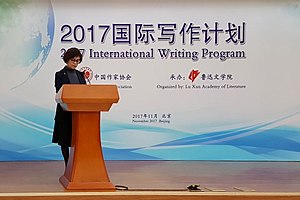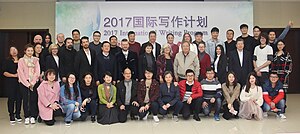Tie Ning
In 1988, she wrote her first full-length novel, Rose Door (Chinese: 玫瑰門), in which she departed from her harmonious and idealistic poetic style, and displayed the dark side of life through the competition for survival among women of several generations.
Xiangxue and other country girls each take a small basket of eggs to the train when it stops and exchange them for things they want that they cannot get in the village.
Tie Ning is critical of the masculine model as a basis for thought about opposition to the power of the party or state and for assuming responsibility over women's lives.
This model is embodied in two male characters who both want to marry the female protagonist because they feel responsible for her earlier marriage to a peasant, which left her a widow and prevented her from returning to the city after the policy of sending educated youths to rural China ended.
In its place, she offers the protagonist's feminine view, that one should determine one's life-course based on one's own needs, desires, and abilities, rather than with reference to either opposition to or compliance with the party-state and its ideology.
Tie Ning's semi-autobiographical novel illustrates how difficult it is for Chinese writers to ignore the national allegory.
Set in the world of writing and publishing, the novel relates the story of a young woman and of two older men who are both in love with her.
The narrative alternates between first- and third-person as the protagonist connects her love affair with her memories of her teenage years, showing how she achieves strength through the interweaving of her private and public lives.

